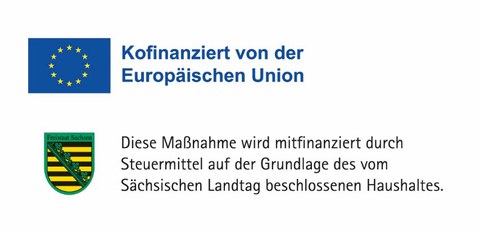RL "Zukunft Berufliche Bildung"
Richtlinie des Sächsischen Staatsministeriums für Wirtschaft, Arbeit und Verkehr zur Förderung der Beruflichen Bildung im Rahmen des ESF Plus 2021–2027 (ESF Plus-Richtlinie Zukunft berufliche Bildung) vom 17. Mai 2022.
Zielstellung:
Zweck der Förderung ist es, durch regionalspezifische und bedarfsgerechte Vorhaben die bestehenden Angebote und Formate der beruflichen Aus- und Weiterbildung weiterzuentwickeln sowie neue und kreative Angebote und geeignete Rahmenbedingungen zu schaffen. Hinzukommend soll die Resilienz der Berufsbildung gestärkt werden, speziell durch die Digitalisierung von Lernangeboten und Methoden, um so flexibler auf die sich wandelnden Arbeitsmarkterfordernisse reagieren zu können.
Folgende aktuelle Herausforderungen der Beruflichen Bildung sollen dabei u. a. besonders betrachtet werden:
- Digitalisierung
- Umweltschutz, Klimaschutz und -anpassung sowie resiliente und kohlenstoffarme Wirtschaftsentwicklung
- Strukturwandel
- spezifische und individuelle Qualifizierungsbedarfe, einschließlich wirtschaftsnahe oder branchenspezifische Maßnahmen der Ausbildungsvorbereitung und -begleitung oder der Erhöhung der Beschäftigungschancen für geringqualifizierte Beschäftigte
- zunehmende Diversität des Fachkräftepotentials und ein geschlechtsspezifisch geprägter Ausbildungs- und Arbeitsmarkt
- betriebliche Aus- und Weiterbildungskapazitäten und -voraussetzungen (insb. KMU)
- notwendige Qualifizierungsbedarfe der Lehrenden bzw. des Ausbildungspersonals (im Zusammenhang mit Berufsbildung)
- Etablierung eines durchgängig dualen Bildungsweges (Verzahnungsmöglichkeiten der dualen Ausbildung mit Weiterbildungsgängen für einen direkten Übergang Schule – Ausbildung – Aufstiegsfortbildung/Duales Studium)
Vorhabensbereiche:
- Regionalspezifische und bedarfsgerechte Vorhaben der beruflichen Aus- und Weiterbildung (Schaffung/ Weiterentwicklung von Angeboten und Formaten der beruflichen Aus- und Weiterbildung - Einzelprojekte Berufliche Bildung)
- Vermittlung von praxisrelevanten Zusatzqualifikationen (Kompetenzzuwachs bei Auszubildenden)
- Vorhaben für eine zukunftsorientierte Berufliche Bildung (Projektaufrufe Berufliche Bildung durch das SMWA)
- Wissenschaftl. Begleitung der o. g. Förderinitiativen (Förderbekanntmachung durch das SMWA)
| Finanzierungsart: | die Zuwendung wird als Projektförderung / Anteilsfinanzierung gewährt |
| Förderquote: | bis zu 80% |
| Empfohlene Laufzeit: | mind. vier Monate – max. drei Jahre |
Förderfähige Ausgaben:
Folgende Ausgaben/ Kosten werden als Pauschale ausgereicht:
- Personalausgaben
- Wegstrecken- und Mitnahmeentschädigung für Teilnehmende
- Aufwandsentschädigung für Teilnehmende je Anwesenheitstag
- 20 % Restkosten (alle übrigen förderfähigen Ausgaben und Kosten) der direkten förderfähigen Personalkosten
- bei Gutachten, Studien, wissenschaftlicher Begleitung, Koordinierung und allen verbleibenden Vorhaben betragen die Restkosten 40 % der direkten förderfähigen Personalkosten
Der Eigenanteil beträgt mind. 20 % der förderfähigen Gesamtausgaben (in Abhängigkeit der Beihilferelevanz). Es können Sachleistungen, kommunale Mittel, Bundesmittel und auch private Mittel zur Erbringung des Eigenanteils eingesetzt werden. Des Weiteren können alle Einnahmen, die mit dem Zuwendungszweck zusammenhängen und im Rahmen der Umsetzung des Vorhabens entstanden sind, zur Deckung verwendet werden.
Zuwendungsempfangende:
Antragsberechtigt sind natürliche Personen mit Unternehmereigenschaft und/oder juristische Personen oder Personenvereinigungen des privaten und öffentlichen Rechts, welche ihren Sitz oder ihre Niederlassung im Freistaat Sachsen haben.
Zielgruppen:
Die Inhalte der Vorhaben müssen sich an folgende Personen richten:
- Beschäftige
- Auszubildende
- Umschüler:innen
- dual Studierende
- Werkstudierende
- Praktikant:innen
- arbeitsmarktnahe oder ausbildungsfähige Menschen/junge Eltern am direkten Übergang in Arbeit oder Ausbildung
- Klein- und Kleinstunternehmen sowie mittlere Unternehmen
- Unternehmende und Selbständige
Vorhabensspezifische Bedingungen:
- Teilnehmende müssen ihren Hauptwohnsitz oder Arbeits- bzw. Ausbildungsort im Freistaat Sachsen haben
- teilnehmende Unternehmen müssen ihren Sitz oder ihre Niederlassung im Freistaat Sachsen haben
- es liegt eine positive Auswahlentscheidung durch die SAB und durch die relevanten regionalen Netzwerkakteur:innen vor
Antrags- und Bewilligungsstelle ist die Sächsische Aufbaubank (SAB). Die Bewilligung wird in einem mehrstufigen Verfahren umgesetzt
1. Formale Prüfung Projektskizzen
Nach Einreichung der Projektskizze (in elektronischer Form), erfolgt die formale Prüfung durch die SAB.
2. Fachlich-inhaltliche Bewertung Projektskizzen
Die fachlich-inhaltliche Bewertung erfolgt anhand von Kriterien (SAB-Vordruck VD 60716). Neben der SAB wird die regionalen Fachkräfteallianzen gemäß dem Durchführungsort als Jurymitglieder am Auswahlprozess beteiligt.
3. Aufforderung zur Antragsstellung oder Ablehnung
Ein vorzeitiger Maßnahmebeginn auf eigenes Risiko wird durch die SAB mit Antragseingang schriftlich genehmigt. Ohne positive Auswahlentscheidung der Jury, wird die Projektskizze abgelehnt.
Die Dauer der fachlichen Bewertung beträgt jeweils ca. sechs Wochen.
Für die Vorhabensbereiche „Einzelprojekte Berufliche Bildung“ und „Zusatzqualifikation“ können fortlaufend Projektskizzen bei der SAB eingereicht werden. Für die Beantragung der Vorhabensbereiche „Projektaufrufe Berufliche Bildung“ und „wissenschaftliche Begleitung“ werden separate Förderbekanntmachungen vom SMWA veröffentlicht.
Die Einreichung der Projektskizze erfolgt über das EPC. Da es sich um eine neue Richtlinie handelt, wird ein gemeinsames Beratungsgespräch mit dem EPC und der SAB vorab dringend empfohlen.
Kontakt am EPC:

Projektmanagerin
NameFrau Ines Synnatzschke
ESF Plus, EFRE/JTF
Eine verschlüsselte E-Mail über das SecureMail-Portal versenden (nur für TUD-externe Personen).
Besuchsadresse:
FAL Falkenbrunnen BT-A Würzburger Straße 35
01187 Dresden

